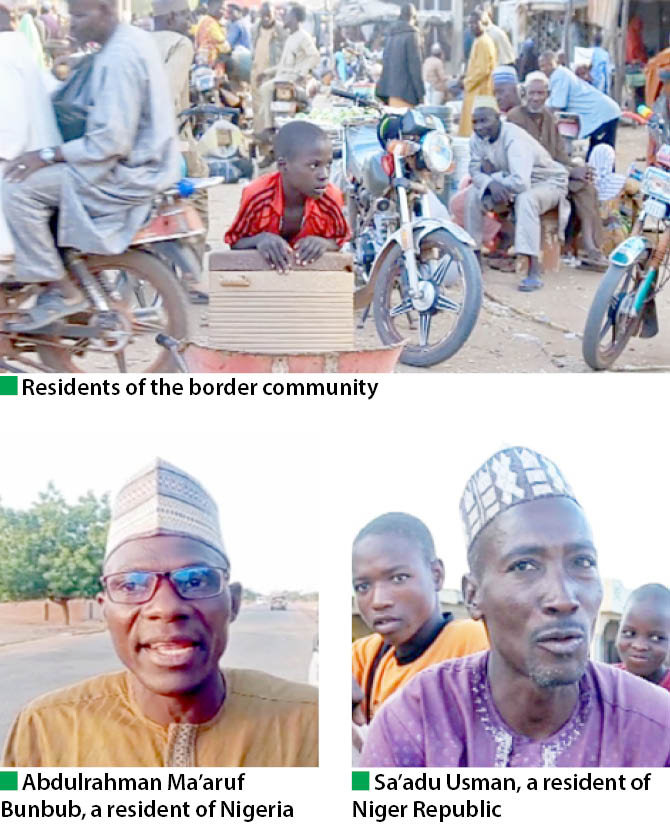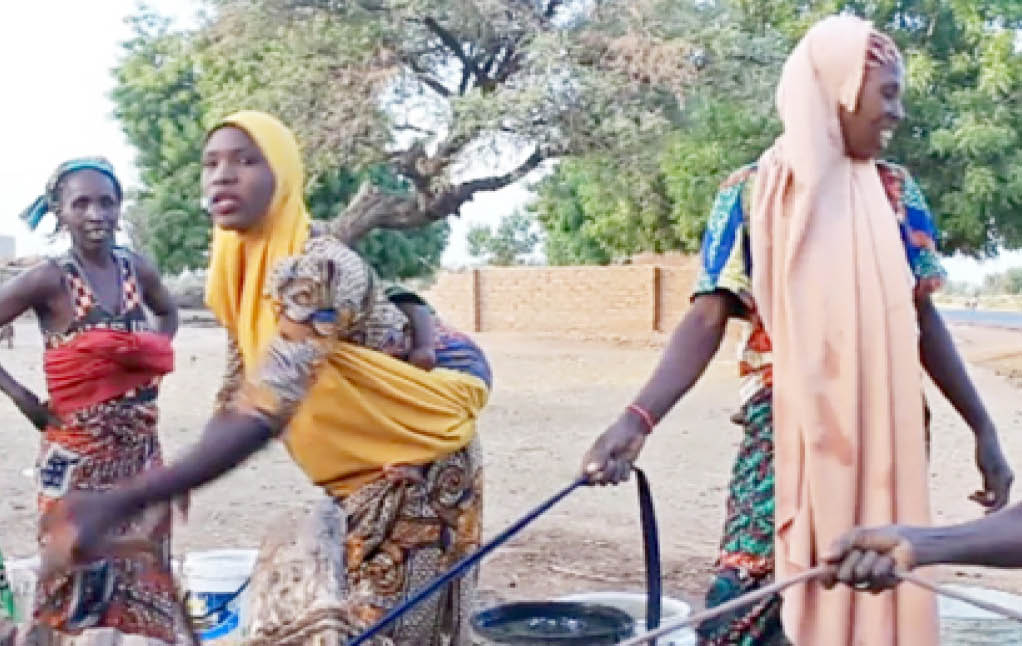Residents of border communities in Katsina State are experiencing the ‘heat’ as Niger border closure continues to cause economic pains and dislocation.
Residents of Magama, Dankama, Bumbun and Kongolom, Babban mutum, all in Jibia, Kaita, Mai’adua and Baure local government areas of Katsina State in Nigeria, are lamenting the decision to close the border with Niger Republic after the July coup in the neighbouring country, saying it frustrates them and the economy of the region.
The Economic Community of West African States (ECOWAS) under the chairmanship of President Bola Tinubu of Nigeria had imposed sanctions on Niger after the expiration of the ultimatum it gave the military leaders to restore the ousted president, Mohammed Bazoum to office.
Life at the border communities has turned to the survival of the fittest as the struggle to make ends meet requires one to have not just the energy but must be fearless and ready to confront border officials.
Some of the residents accused the Nigerian government and ECOWAS of making the policy decision hastily, which they said contributed to the collapse of the socio-economic setting of the border communities.
Daily Trust on Sunday reports that electricity and other basic necessities are supplied once in a while; hence many businesses that depend on power supply have collapsed, a situation that has rendered artisans jobless. And this has economic consequences, not only on residents but the country as a whole.
At Birnin Kuka, a border-control post in Mashi Local Government, security men prevented this reporter from taking pictures as residents staged protest accusing them of extortion, and calling on the Nigerian government to reverse the border closure.

Sa’adu Usman, a Nigerian, said that since the border closure in August, citizens of the two countries had resorted to transporting goods and services on ox carts through illegal routes after paying huge amounts of money to border security operatives.
“We are really in a very sad situation. As residents of border communities, our economy has collapsed. We don’t have anything, and anytime we want to cross the border, we have to pay money to security men. We are suffering to make ends meet?” Usman said.
Apart from enduring harsh economic realities, the border communities are also battling with perennial water shortage, lack of social amenities and unbearable cost of living. Many of them look malnourished.
He said, “From Jibia in Katsina State to Maigatari in Jigawa, any resident of a border community who tells you that he finds it easy is lying. We are being treated like animals. Border officials extort, harass and intimidate anybody who buys goods from any part of this country. Sometimes we wonder if we were really seen as Nigerians. Our only offence is that we live along border areas. When does that become a crime?”
However, a resident of Niger Republic, Sa’adu Garba, who often crosses into Nigerian villages with little amount of money to buy basic goods and go back to his country, said it was cheaper to buy things in Nigeria than Niger due to exchange rate and continuous devaluation of the naira.
“You know our currency has a higher value than the naira, so if we buy things in Nigeria we get more value because of exchange rate.
“Talking about security operatives manning borders, I think there is the need for close supervision by their superior officers because of corrupt tendencies,” he said.
In one of the videos recently released by one of the vocal northern leaders in Nigeria, Professor Usman Yusuf, he advocated the ease of sanctions imposed on Niger Republic by ECOWAS, which he said had badly affected the socio-economic lives of residents in the seven states sharing borders with Niger.
Yusuf, who is also a former executive secretary of the National Health Insurance Scheme, said the economic sanctions imposed on Niger had caused hunger and starvation, killing women, children and the elderly in Niger.
He said residents of border communities in Nigeria were facing abject poverty, a situation he said could further escalate the insecurity already ravaging Kebbi, Sokoto, Zamfara, Katsina,Yobe and Borno states.
The professor also said, “Residents of the seven core northern states have been denied access to food, medicare and other basic necessities, simply because of the sanctions imposed on Niger.”
He called on northern leaders, irrespective of religion and ethnic affiliations, to prevail on ECOWAS under the chairmanship of President Tinubu to reconsider the hardship meted on innocent citizens of Nigeria and Niger and lift the sanctions.
He further said the closure of the border with Niger had affected every facet of human endeavours, subjecting many people to hardship and leaving locals at the mercy of security operatives who are feeding fat from extortion.
Similarly, the 5th Wazirin Katsina, Professor Sani Lugga, had in September 2023 predicted that sanctions on Niger Republic would do more harm than good to the citizens of the two countries. He noted that residents of the seven states sharing borders with Niger would face severe repercussions as a result of common culture, religion and geographical location.
Professor Lugga advised ECOWAS and the Nigerian government to apply caution in dealing with the situation due to the potential danger it would portend to the socio-cultural and economic ties between people of both countries.
He also appealed to northern governors, traditional institutions, political actors and religious leaders to prevail on President Tinubu and ECOWAS not to take hasty decisions that would jeopardise not only Niger but states in Nigeria.
Professor Lugga said, “The danger is that if you cut off power supply to Niger Republic and the country decides to construct a dam on the same river that supplies water to Kainji within its own territory, what would be the consequences?
“Don’t forget that the water that flows into Sokoto, Kebbi, Niger and Kogi is the same water being used by both wet and irrigation farmers in those states. So, what do you think would be the fate of those farmers if it is cut off? We need to think twice, especially in the North.”
Another northern leader who is worried by the current situation in Niger, Sani Liti Yankwani, wondered what ECOWAS and the Nigerian government wanted to achieve by its action, arguing that this is not the first military coup in the neighbouring country but something similar to this had never happened. He recalled that there were military coups in Mali, Cote Ivoire and other African countries, yet a sanction like this was never imposed on them.
Yankwani, who is a former Majority Leader in the Katsina State House of Assembly, alleged that the Tinubu-led federal government and ECOWAS member- states were playing politics and doing the bidding of Western countries. He warned that the North should not be pushed to the brink, saying hardship as a result of sanctions was too much for the residents of the seven states sharing borders with Niger Republic to bear.
Yankwani said, “Unless there is an ulterior motive against the core northern states, I don’t see reasons for this sanction. Now, if you look at it carefully and with all honesty, all of us are paying the price. Why should we be punished for the offence we did not commit? There is suffering everywhere and our leaders, especially our representatives, have kept mute.”
He charged northern leaders to have unity of purpose in order to salvage the region from a looming anarchy and total collapse.
Dr Murtala Abdullahi Kwara of the Umaru Musa Yar’adua University, Katsina, said there was no point cutting off food, medical supplies and other basic necessities to communities sharing borders with Niger Republic unless they were carved out of Nigeria. He said what is happening in the communities was unacceptable.
He described the situation at the border communities as dire and overwhelming, and advised the Nigerian government to allow the supply of food and basic necessities to the border communities.
He also suggested that Nigerien citizens should pressurise the military junta in their country to succumb to some demands presented by ECOWAS to help in bringing the political impasse to an end.




